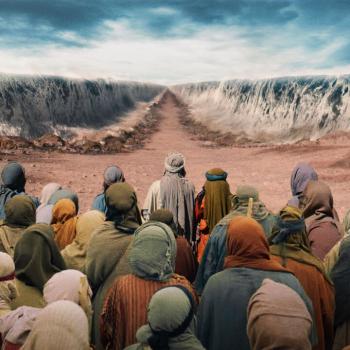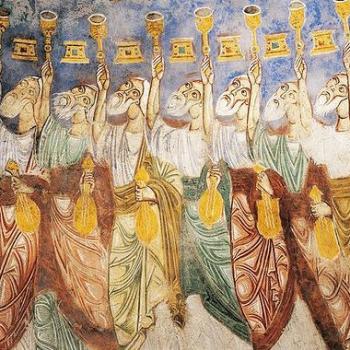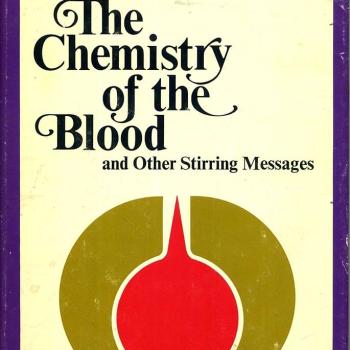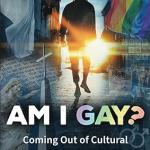Continuing on from where I left off…
So, traditional Christian belief about life after death is, I believe, virtually disappearing from American Christians’ consciousness due to folk religion conveyed through popular culture, funeral sermons, popular hymns and songs and the lingering influence of Spiritualism (a type of gnosticism) in American religious history. A major recent influence on this disappearance of traditional belief about life after death is the spate of books and television programs about so-called “near death experiences.” Unfortunately, too many Christians are basing their ideas about life after death on all of these rather than on sound biblical teaching or theological reflection. I have found many committed evangelical Christians (and others) highly resistant to any correction of their folk religious visions of life after death.
The prevailing folk religious view is that upon dying a person goes immediately and directly to “heaven” in the sense of the fullness of being in God’s presence–the consummation of the blessed hope of redeemed existence with Christ and all the saints. Lost is any idea of an intermediate state distinct from the future resurrection, judgment and new creation that forms the true blessed hope of the New Testament. I have yet to see or read in any of these reports of death experiences any reference to bodily resurrection, new creation (new heaven and new earth), future universal judgment or an intermediate state called “paradise” where the dead in Christ await all of that. Rather, nearly all the popular images portray the afterlife as complete and final immediately after death. In other words, at best, the consummation of God’s promises to the redeemed is collapsed into a bodiless spiritual bliss in a heavenly realm with God, Christ and all the saints sometimes even including mansions, pearly gates, streets of gold, etc.
Sidebar: SOME Christian scholars reject traditional Christian teaching about the intermediate state of conscious but bodiless existence in paradise with Christ awaiting resurrection and heaven for reasons not related to folk religion. This is a completely different phenomenon. One could mention Oscar Cullman, Stanley Grenz and a host of other mostly 20th century theologians who rejected the intermediate state–collapsing it into the future resurrection and fullness of heaven (new heaven and new earth). The reasons usually given (I had many long talks with Stan Grenz about this) have to do with belief in a holistic unity of the human person–a so-called “Hebraic” versus “Greekish” view of human personhood. I won’t get into that very much now; suffice it to say I’ve never been convinced that a cautious duality (not dualism) of body and soul/spirit is necessarily “Greekish.” It seems to me to be presupposed everywhere in Scripture.
So, now we have two rejections of the intermediate state–one based on folk religion that collapses the ultimate future (heaven) into the intermediate state (paradise) and one that collapses the intermediate state (paradise) into the ultimate future. The former denies or at least neglects the bodily nature of full redemption and the latter denies the possibility of bodiless, conscience existence and thus has to adopt something like soul sleep. (Stan Grenz claimed that upon death a person leaps directly into the ultimate future–something I find in conflict with Paul’s teaching about the future in his Thessalonian letters.)
(I can’t resist a side bar comment here about Stan and me. We were very close friends–almost like brothers. We always roomed together at professional society meetings and stayed awake until 2:00 AM or later debating theology. One of our friendly arguments was over the intermediate state. He denied it. When he died a very untimely and tragic death at age 55 in 2005 I thought to myself and said to a few shared friends that now he knows I am right about this! I don’t mean that in any disrespectful way; I mean it as an expression of my genuine belief that Stan is now with the Lord and will be raised together with all of God’s people in that final future we call heaven that will be inaugurated when Christ returns.)
So why believe in a bodiless, conscious intermediate existence between bodily death and heaven? (Here and henceforth I use “heaven” as a cipher for the new heaven and new earth Paul talks about in Romans 8 and that is foretold in Revelation and elsewhere.) I could argue that it is traditional Christian belief. One finds it in nearly all the church fathers and medieval theologians and Protestant reformers and post-Reformation evangelical theologians. It is the mainstream Christian consensus. But I won’t rely on that. Rather, I’ll point to what I believe is irrefutable Scriptural evidence for it.
First, Jesus said to the thief on the cross that he would be with him in paradise that very day. Some have tried to say that Jesus meant “I tell you today, you will be with me in paradise,” but I consider that construal of Jesus’ promise ludicrous. Second, the story of Jesus’ meeting with Moses and Elijah on the Mount of Transfiguration assumes it. Third, New Testament references to Jesus descent into Sheol to preach assumes it. Fourth, reports of saints being seen walking the streets of Jerusalem after Jesus’ death (whether interpreted literally or not) demonstrates that the writers of the New Testament believed in an intermediate conscious state. Fifth, Jesus promised his disciples that he would go away and prepare a place for them so that when he returned he would take them there to be with him. That proves that the fullness of heaven is only at the parousia or afterwards. Sixth, Paul spoke about a man he knew (probably himself) who died and went to the third heaven and heard things not to be repeated. Seventh, the entirety of 1 Corinthians 15 assumes the futurity of full redemption and emphasizes its bodily nature. Together with Romans 8:18-25 this demonstrates that at least Paul believed in a future (eschatological) fulfillment of redemption such that mere “life after death” cannot be that fulfillment. Eighth, Paul talked about being away from the body and present with the Lord (with the body being “this earthly tent” and death its being “taken down”).
I could marshal more evidence from Scripture for a bodiless but conscious intermediate state BEFORE the resurrection and heaven. But I’ll stop with those points for now.
This discourse about personal eschatology, life after death, is meant as a case study in folk religion invading American Christianity. (I would like to hear from Christians in other parts of the world about this there.) I could talk about folk religious belief about the Trinity (“one in three, three in one”), the person of Jesus Christ (“God in human skin”), the atonement (“Jesus got in the way of God’s wrath”), the Holy Spirit (a force or power, not a person), the church (an aggregate of individuals rather than a communal reality), baptism among Baptists (baptizing little children and calling it “adult baptism!”), the Bible (bumper sticker seen recently: “If it ain’t King James it ain’t Bible!”), etc., etc., etc.
My point takes the form of a question: What has happened to doctrinal teaching in American churches–beyond fundamentalist churches? I had the privilege of growing up in a Pentecostal church where I was exposed to lots of Bible study and doctrinal teaching. Some of it was distorted, but at least the pastor and the elders and teachers really believed it was important to inculcate sound doctrine in believers. (Fortunately, in this particular church, asking questions and even expressing certain doubts was not forbidden or cause for ostracism.) I know without any doubt that IF someone had expressed any other belief than the one I’ve outlined above he or she would have been gently corrected by the church’s leaders. We were inoculated against theology in popular culture–which is not to say we thought everything in popular culture was wrong. We were taught to check everything by the Bible and not swallow images, ideas, beliefs just because they sounded spiritual or comforting. Funeral sermons were about the resurrection, not some folk religious “heaven” immediately after death. There is much I disdain and regret about the church(es) I grew up in; they were far from perfect. Spiritual abuse was rampant. There was a very strong anti-intellectualism with regard to philosophy and science. But at least we were “grounded in the Word.” I first read the Bible cover to cover at age 10 which was normal in our church. I knew large portions of the Bible by heart (whole psalms and entire chapters of the New Testament). One thing my pastor (who happened to be my father) did that was especially helpful was stop and explain the meanings of hymn lyrics. Many hymns sung became springboards for mini-sermons about theology. I now know he wasn’t always theologically right, but at least he wanted to make sure we didn’t just sing hymns without thinking about the words and the messages.
So, is heresy a problem in American Christianity? Yes, to be sure. But a much greater problem, I believe, is the replacement of biblical, doctrinal and theological knowledge by folk religion. Many Christian young people know more about The Matrix than about Romans–and that from their own Sunday School classes and youth group meetings!
End of tirade. 🙂
















